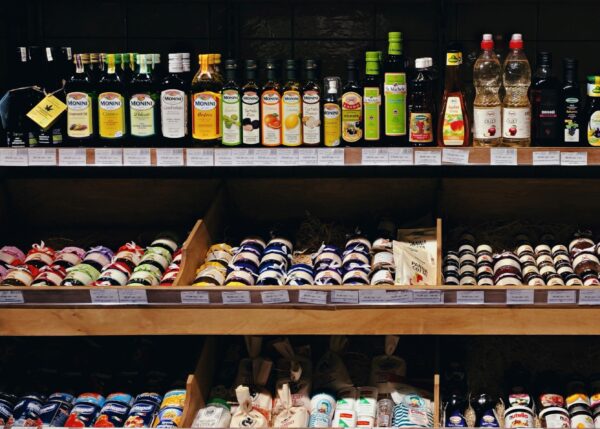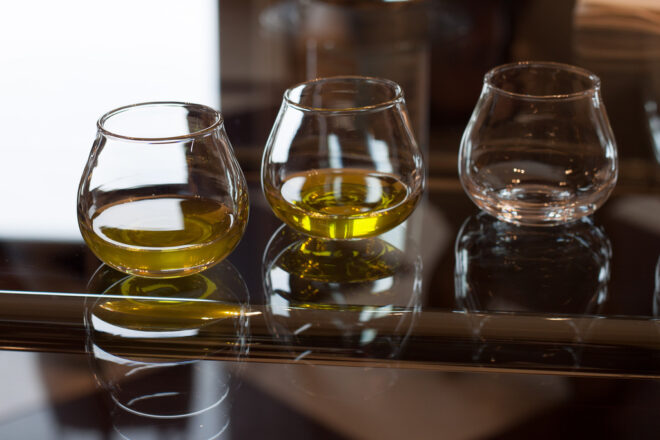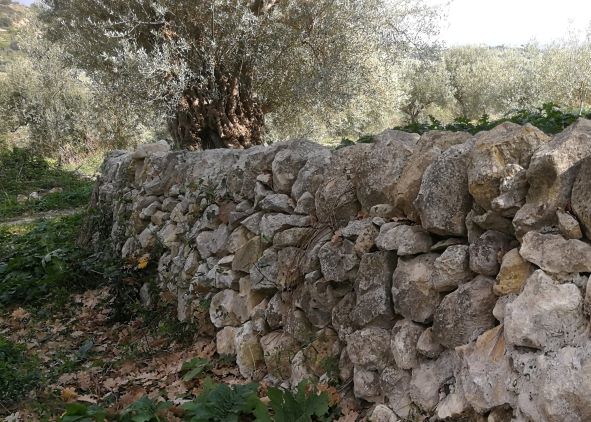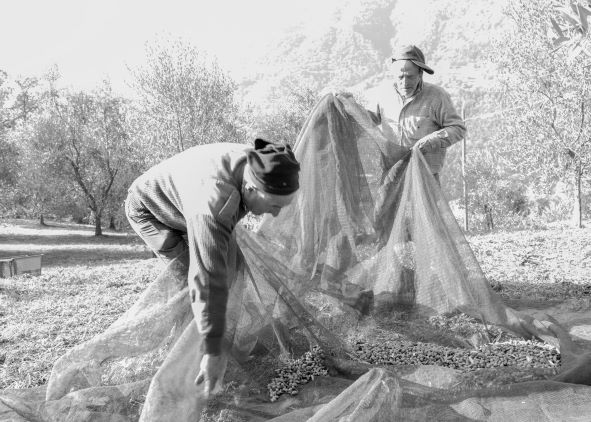Into our 6th year of producing organic extra virgin olive oil, we at il circolo are becoming more and more ambitious. Our aim is to produce an excellent olive oil, not just to our own standards, but to those who are experts in the industry. It is clear to us, that creating an olive oil that wins awards requires unwavering determination, exceptional skill, and a meticulous focus on every intricate detail. Each step of the journey, starting from the harvest all the way to the bottling stage, demands flawless execution in order to yield one of the finest olive oils in the world.
One way to get feedback on the quality of olive oil is to participate in an olive oil competition. Olive oil competitions typically award olive oils in different categories and recognize outstanding individual olive oil brands or producers. These competitions follow a rigorous evaluation process where expert panels of judges, including olive oil tasters, sommeliers, and industry professionals, assess the participating olive oils following a rigorous protocol to examine the sensory characteristics of each sample through blind tastings. The judging panels evaluate the oils based on various sensory attributes, including taste, aroma, balance, complexity, and harmony. We are very proud that this year our Moresca D.O.P. received the Silver Award at the Amsterdam International Olive Oil Competition, and our Selezione Superiore received the Silver Award at the Berlin Global Olive Oil Award (Berlin GOOA).
The competitions aim to provide a platform for olive oil producers to showcase their products, gain recognition, and connect with industry professionals and consumers. Winning an award can serve as a mark of quality and distinction for olive oil producers. It also provides an opportunity for networking, knowledge exchange, and promoting olive oil culture among participants and attendees. There are many different olive oil competitions around the world, so that we decided to do some research and introduce the most recognized to you.

The most important olive oil competitions in Italy
Italy is renowned for its high-quality olive oil production, and there are several important olive oil competitions held within the country. Some of the most significant olive oil competitions in Italy include:
- Sol d’Oro: Sol d’Oro is a prestigious international competition. The competition is held on two occasions during the year: in February for Northern Hemisphere olive oils and September for those from the Southern Hemisphere. It focuses on extra virgin olive oils and aims to promote excellence in olive oil production. The competition follows a strict evaluation process and awards outstanding oils in various categories. It is organized by Veronafiere since 2002. The objective is to valorise the best extra virgin olive oils from local areas in all producer countries and promote then in a sales context. In any case, the history of the contest goes back to the early 1990s with the Leone d’Oro award.
- Leone d’Oro dei Mastri Oleari: This competition, also known as the “Golden Lion of Olive Masters,” is probably the most selective olive oil competition in the world. It is held in Italy and highlights the quality and craftsmanship of olive oils. It awards 7 olive oils in 7 categories (monocultivar Italy, blend Italy, organic Italy, small producers, monocultivar international, blend international, organic international) that demonstrate excellence in production and taste. It has a single, professional panel, made up of 13 professional olive oil tasters, coordinated by Panel Leader Maria Paola Gabusi and accredited by the Italian government agency Mipaaf. The panel tastes each week, all year long. The panel tastes no more than 12 samples at each session, during which each oil is carefully analyzed and discussed by the panel. Each sample is re-tested at a later time to evaluate the shelf life.
- L’Orciolo d’Oro: L’Orciolo d’Oro is an Italian competition that originally took place in the region of Pesaro, Marche. In the first years it evaluated exclusively extra virgin olive oils produced in Italy but today recognizes exceptional oils from all over the world in different categories. It originated in the second half of the 1980s, based on an idea by Marta Cartoceti.
- Flos Olei: Flos Olei is an international guide and competition that focuses on high-quality extra virgin olive oils. It includes a comprehensive assessment of olive oil producers worldwide, with a significant focus on Italian oils. The panel, coordinated by Marco Oreggia, is constituted by expert Italian and international tasters with COI certification, also enrolled in the National Registry of Technicians and Experts of Virgin and Extra Virgin Olive Oil.
- Ercole Olivario: Although not strictly limited to Italian olive oils, the Ercole Olivario competition has a long-standing tradition in Italy. It promotes and rewards exceptional olive oils, and Italian producers often participate in this prestigious competition. The Ercole Olivario is widely recognized as one of the oldest and most prestigious olive oil competitions in the world. It was established in 1963 in Italy and has a long-standing history of promoting and celebrating high-quality olive oils. The Ercole Olivario competition takes place annually and focuses on Italian extra virgin olive oils. It brings together olive oil producers, industry experts, and judges to evaluate and recognize the best olive oils in different categories. The competition awards for each of the two categories extra virgin and extra virgin DOP and IGP oils the first label for the following types: light fruity, medium fruity and intense fruity. The further 6 prizes are awarded, regardless of the category. It also awards the 5 special prizes: Organic Extra Virgin Olive Oil; Best packaging; Young Entrepreneur, Monocultivar Oil, Lekythos (to the personality committed to spreading knowledge of Italian quality oil in Italy and abroad). Throughout its history, the Ercole Olivario has become a symbol of quality and has provided a platform for producers to showcase their products and gain recognition both within Italy and internationally.
- Premio Biol: Held in Italy, Premio Biol is dedicated to organic extra virgin olive oils. It evaluates organic oils from different regions and awards excellence in organic olive oil production.
Prestigious olive oil competitions held around the world
The landscape of olive oil competitions is dynamic, and new competitions have emerged over time. While Ercole Olivario is among the oldest and most renowned competitions, there are several prestigious olive oil competitions held around the world to recognize and promote the quality of olive oils.
- New York International Olive Oil Competition (NYIOOC): It was established in 2013 as an annual event in New York City, United States. Today it is one of the largest and most prestigious competitions held annually. It attracts producers from around the globe and is known for its rigorous judging process. In 2020, the competition received more than 900 entries from various countries.
- Mario Solinas Quality Award: Organized by the International Olive Council (IOC), the Award was launched in the 2000–2001 crop year in the wake of the Council’s 1993 decision to create it as a memorial and tribute to one of the most important advocates of the sensory analysis of virgin olive oil, the late Italian Professor Mario Solinas. This competition recognizes excellence in extra virgin olive oils worldwide. The awards are given in different categories, including intense fruity, medium fruity, and mild fruity.
- London International Olive Oil Competitions (London IOOC) is an international competition, where olive oils from different countries are blind tasted and evaluated by expert judges. The competition aims to recognize and honor outstanding olive oils, promote quality standards, and provide valuable feedback to producers. Awards are issued in the categories ‘Quality’, ‘Packaging’, ‘Health claims’ and ‘Infused oils’.

- One well-known competition in Germany is the “Der Feinschmecker Olive Oil Awards,” organized by the gourmet magazine Der Feinschmecker. This competition evaluates olive oils from different regions and awards top-quality oils in various categories.
- The Berlin Global Olive Oil Award (Berlin GOOA) is an international olive oil competition held annually in Berlin, Germany. It aims to recognize and promote the quality and excellence of extra virgin olive oils from around the world. Awards are issued in the categories ‘Quality olive oil’, ‘Quality organic olive oil’, ‘EVOO Stars Design’, ‘EVOO Stars Innovation’, ‘High Polyphenols’ and ‘Infused olive oils’.
- The Amsterdam International Olive Oil Competition is a relatively new annual event that takes place in Amsterdam, Netherlands. It attracts entries from olive oil producers around the world. The competition aims to recognize and promote high-quality extra virgin olive oils and to raise awareness about the diversity and excellence of olive oil production globally. The competition follows a rigorous evaluation process, with an expert panel of judges assessing the olive oils through blind tastings based on various sensory attributes, such as aroma, taste, and balance.
- The Athena International Olive Oil Competition is annually held in Greece since 2015. The tasting is blind, with a panel of handpicked judges who are all recognised experts for several years and accredited by the IOC (International Olive Council). Judges come from different countries and the competition begins in the morning, where each judge only tests a maximum of 35 samples per day. The awards are given in different categories, including different cultivars, different regions as well as infused oils.

What does the jury in an olive oil competition do?
Olive oil tasting, often referred to as olive oil sensory analysis, involves a systematic process of evaluating the aroma, taste, and overall quality of the oil. The tasting is typically done by trained professionals known as olive oil tasters or sensory panelists. The tasters ensure they are in a neutral environment, free from strong odors or distractions that could influence their senses. They also use specific tasting tools, such as blue or green tasting glasses, which help mask the color of the oil. The tasters examine the color and clarity of the oil against a white background. While color can provide some information about the olive oil’s variety and maturity, it is not an indication of quality.
For the aroma assessment the tasters warm the glass containing the oil in their hands to release its aromatic compounds. They then swirl the oil in the glass and inhale deeply to evaluate the intensity and quality of the aroma. In order to evaluate the taste, tasters take a small sip of the oil, aspirate some air through their teeth to aerate it, and distribute it throughout their mouths. They pay attention to various taste attributes, including fruitiness, bitterness, pungency (peppery sensation), sweetness, and any other flavors present. They assess the balance, complexity, and harmony of these taste sensations. At the end tasters observe the lingering sensations and flavors that remain in their mouths after swallowing the oil. The length and persistence of these sensations, as well as any positive or negative aftertastes, contribute to the overall evaluation.
Most tasters follow the method established by the International Olive Oil Council and described in their rules and regulations. These regulations specify the following accessories, which tasters need to perform their task properly:
- Standardised (opaque blue) containing the samples, code numbered, covered with a watch-glass and kept at 28ºC +/- 2ºC
- Hard or soft copy of the profile sheet
- Pencil or ballpoint pen
- Tray with slices of apple
- Glass of water at ambient temperature
For scoring and feedback tasters use the standardized scoring system to rate the oil based on various attributes, and provide detailed feedback and descriptions of the oil’s sensory characteristics, which can be valuable for producers and consumers.
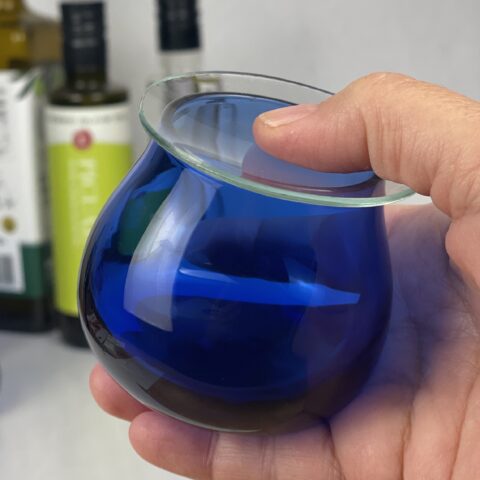
What are the main categories used to classify olive oil tastes?
The main categories used to classify olive oil tastes are based on the sensory attributes perceived by the taste and smell. The most commonly used classification system is:
- Delicate/Mild: This category includes olive oils with a mild flavor profile and subtle aromas. They have a delicate and light taste, often with hints of sweetness. These oils are typically made from early-harvest olives and are less intense in flavor.
- Medium: Olive oils in this category have a balanced flavor profile with moderate fruitiness, bitterness, and pungency. They offer a harmonious combination of flavors and are versatile for various culinary uses.
- Robust/Intense: This category comprises olive oils with a strong and robust flavor profile. They exhibit pronounced fruitiness, bitterness, and peppery or pungent sensations. These oils are often made from fully ripe olives or specific olive varieties known for their intense flavors.
What descriptors are used to characterize olive oil tastes?
The jury members of olive oil competitions use a standardized set of descriptors to characterize olive oil tastes. Each olive oil is analyzed according to the International Olive Council’s sensory analysis evaluation form, which measures the intensity of the perception of aromas and taste characteristics. While the specific descriptors may vary slightly between competitions, here are some commonly used terms:
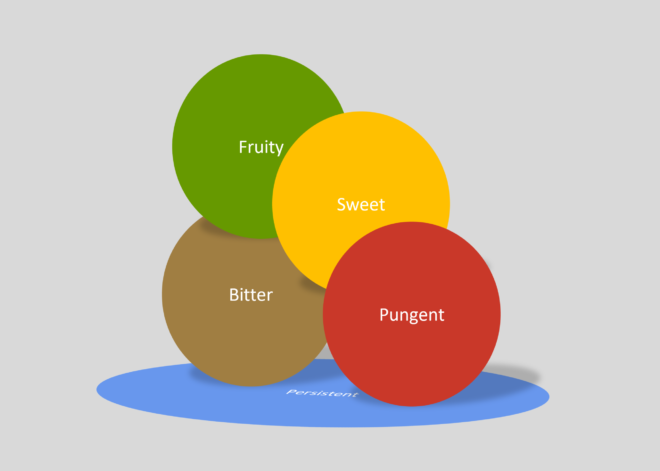
- Fruity: This descriptor indicates the presence of fruitiness in the olive oil, which can range from mild to intense. The fruitiness can be reminiscent of ripe or green olives, as well as other fruits like apple, tomato, or banana.
- Sweet: Complex gustatory-kinaesthetic sensation characteristic of oil obtained from olives that have reached full maturity.
- Bitter: Bitterness is a desirable attribute in high-quality olive oils. It refers to the pleasant and characteristic bitter taste that can be perceived on the palate. It can range from subtle to pronounced, adding complexity to the oil’s taste profile.
- Pungent/Peppery: Pungency refers to the peppery or tingling sensation in the throat that some olive oils exhibit. It is a result of the presence of natural antioxidants called polyphenols. A strong and persistent pungency is often considered a positive attribute.
- Persistence: Persistence is a positive attribute in the tasting of virgin olive oils that appears when the different fruity aspects and favourable sensations remain for a long time once tasted in the mouth.
Additionally olive oils are often described in terms of the following properties:
- Balanced: This term indicates a harmonious balance between the various taste elements, including fruitiness, bitterness, and pungency. It suggests that the flavors are well-integrated and complementary.
- Complex: Complex olive oils display a wide range of aromas and flavors, often with multiple layers of taste sensations. This descriptor signifies the presence of diverse and nuanced characteristics.
- Grass/Green: This descriptor refers to the presence of fresh grassy aromas and flavors in the olive oil, reminiscent of freshly cut grass or green vegetation.
Herbaceous: Herbaceous notes indicate the presence of herbal aromas and flavors, which can be reminiscent of herbs like basil, mint, or leafy greens.
- Nutty: Nutty flavors, such as almond or walnut, can be present in certain olive oils, providing a pleasant and distinctive taste.
These descriptors, among others, are used by expert tasters to evaluate and judge olive oils in competitions. The juries assess the oils based on their sensory characteristics, following specific guidelines and scoring systems to determine the quality and excellence of the oils.
And then there is a long list with descriptors, that help to name certain olfactory sensations, such as: almond, apple, artichoke, camomile, citrus, eucalyptus, exotic fruit, fig leaf, grass, green pepper, green complex (the typical odour of fruit before it ripens), greenly fruity (typical of oils obtained from olives that have been harvested before or during colour change), herbs, olive leaf, pear, pine kernel, ripely fruity (typical of oils obtained from olives that have been harvested when fully ripe), soft fruit (typical of soft fruit like blackberries, raspberries, bilberries, blackcurrants and redcurrants), sweet pepper, tomato (leaves), vanilla (natural dried vanilla powder or pods, different from the sensation of vanillin), and walnut.
Curious about award-winning extra virgin olive oil?
Then you’ve come to the right place. You can find our award-winning organic extra virgin olive oil in our webshop. Take a look and get to know our products!
